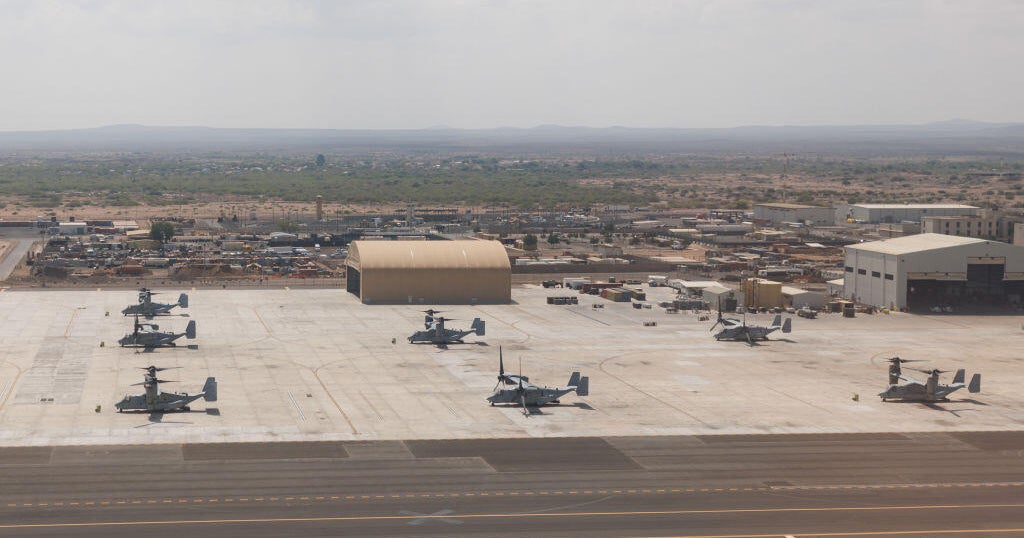A top Immigration and Customs Enforcement official on Thursday detailed what she said were deplorable and unsafe conditions faced by ICE staff and a group of migrants with criminal records who were transferred to a U.S. military base in the African country of Djibouti after a federal judge blocked officials from deporting them to South Sudan.
Melissa Harper, the No. 2 official in the ICE division responsible for deportations, revealed in a sworn declaration in federal court in Massachusetts that the detainees are being held in a shipping container repurposed as a conference room inside Camp Lemonnier, a U.S. Navy installation. Eight migrant detainees from Asia, Latin America and South Sudan who had been convicted of serious crimes in the U.S. were flown to the base last month after a judge said they could not be sent to South Sudan without being given a chance to contest their deportation.
Harper outlined a series of concerns about the arrangement, describing inadequate security equipment, illness among government employees and 100-degree outdoor temperatures. She detailed risks from exposure to malaria, nearby burn pits and potential attacks from terrorists in Yemen, presumably the Houthis.
Officials have said the men currently detained in Djibouti — who hail from Cuba, Laos, Mexico, Myanmar, South Sudan and Vietnam — were convicted of murder, sexual offenses and other serious crimes and had been ordered deported from the U.S.
Harper said the detainees were placed in a converted shipping container at the naval base because it was “the only viable place to house them.” There are 11 ICE officers assigned to guard the detainees, and two ICE employees serving as medical staff. Those officers, Harper said, “do not have the capacity to maintain constant surveillance, custody, and care” of the detainees.
“Only one alien is allowed to use the toilet or shower at a time, and one officer is required to escort the alien. Aliens are permitted to shower every other day, and showers occur at night due to the heat,” Harper wrote, adding that the room is “not equipped nor suitable for detention of any length, let alone for the detention of high-risk individuals.” Due to limited lighting in the room, both the detainees and the officers are all at risk if an altercation were to occur, Harper wrote.
Harper said burn pits in close proximity to the military base, used by locals as a way of eliminating trash and waste, have resulted in a “smog cloud” that has made breathing difficult for ICE officials.
“Within 72 hours of landing in Djibouti, the officers and detainees began to feel ill,” Harper wrote. “ICE officers continue to feel ill with symptoms such as coughing, difficulty breathing, fever, and achy joints. These symptoms align with bacterial upper respiratory infection, but ICE officers are unable to obtain proper testing for a diagnosis.” Some medicine has been used to manage the symptoms, but Harper said it’s “unknown” how long the medical supply will last.
In addition to respiratory infection fears, Harper said everyone disembarked the plane initially destined for South Sudan without being on anti-malaria medication, resulting in an “unknown degree of exposure” to the disease.
Harper said ICE officials were warned by Department of Defense personnel about an “imminent danger of rocket attacks from terrorist groups in Yemen.” She said ICE staff lack body armor that would protect them from any such attacks.
In a statement, Department of Homeland Security spokeswoman Tricia McLaughlin faulted the Massachusetts federal judge who blocked the deportations to South Sudan for the conditions in Camp Lemonnier, accusing him of “putting the lives of our ICE law enforcement in danger by stranding them in Djibouti without proper resources, lack of medical care, and terrorists who hate Americans running rampant.”
That judge, Brian Murphy, ordered the Trump administration to halt the planned deportations to South Sudan after lawyers informed him of a flight to that African country that had already taken off. He cited a previous ruling he issued in April that barred officials from deporting migrants to third countries, without affording them certain due process rights first.
Murphy subsequently ordered the government to allow the would-be deportees to be interviewed by U.S. asylum officers to determine whether they could be tortured in South Sudan, the world’s youngest country and a nation plagued by political turmoil, conflict and violence. He said those interviews could be conducted in the U.S. or overseas.
Resources from the Defense Department are being used to care for the detainees, according to Thursday’s court filing, which is “causing disruption” to the base’s operations and depleting resources meant for service members. Officials at the base, the filing said, have also expressed frustration about holding detainees with violent criminal records near Defense Department living quarters.
According to the Navy, the base supports nearly 4,000 military, civilian, and defense contractor personnel from the U.S. and other allied countries.
Read the full article here


